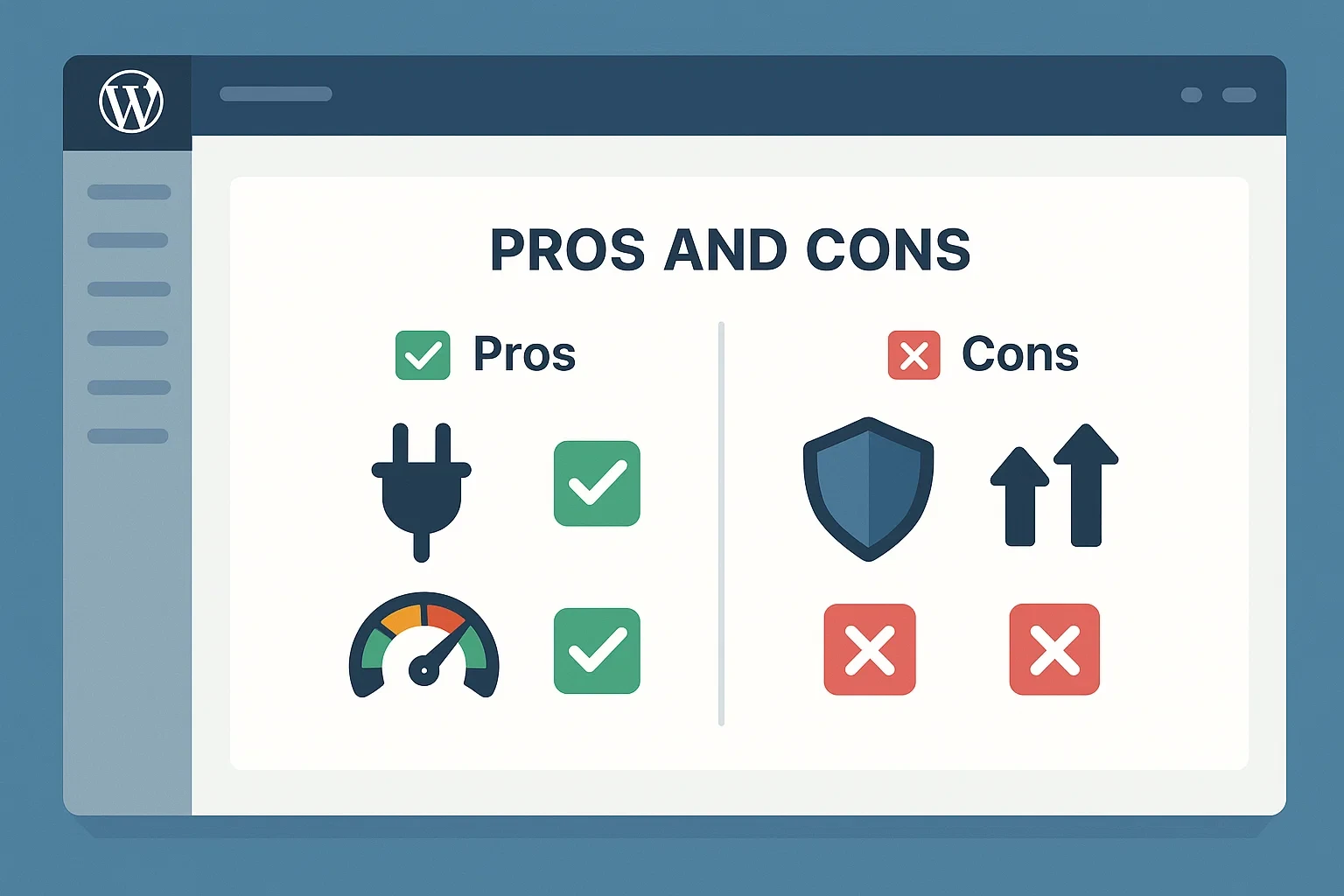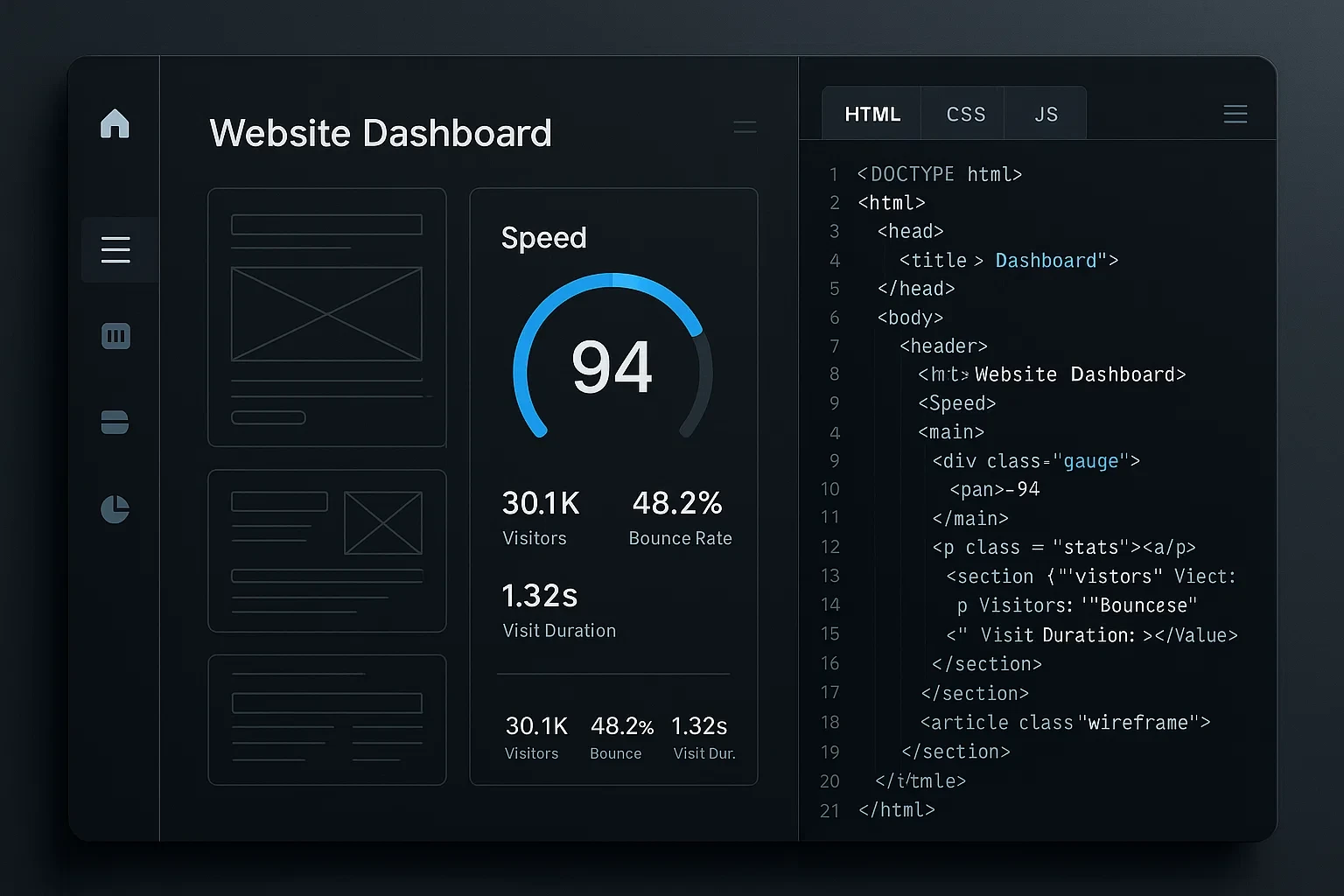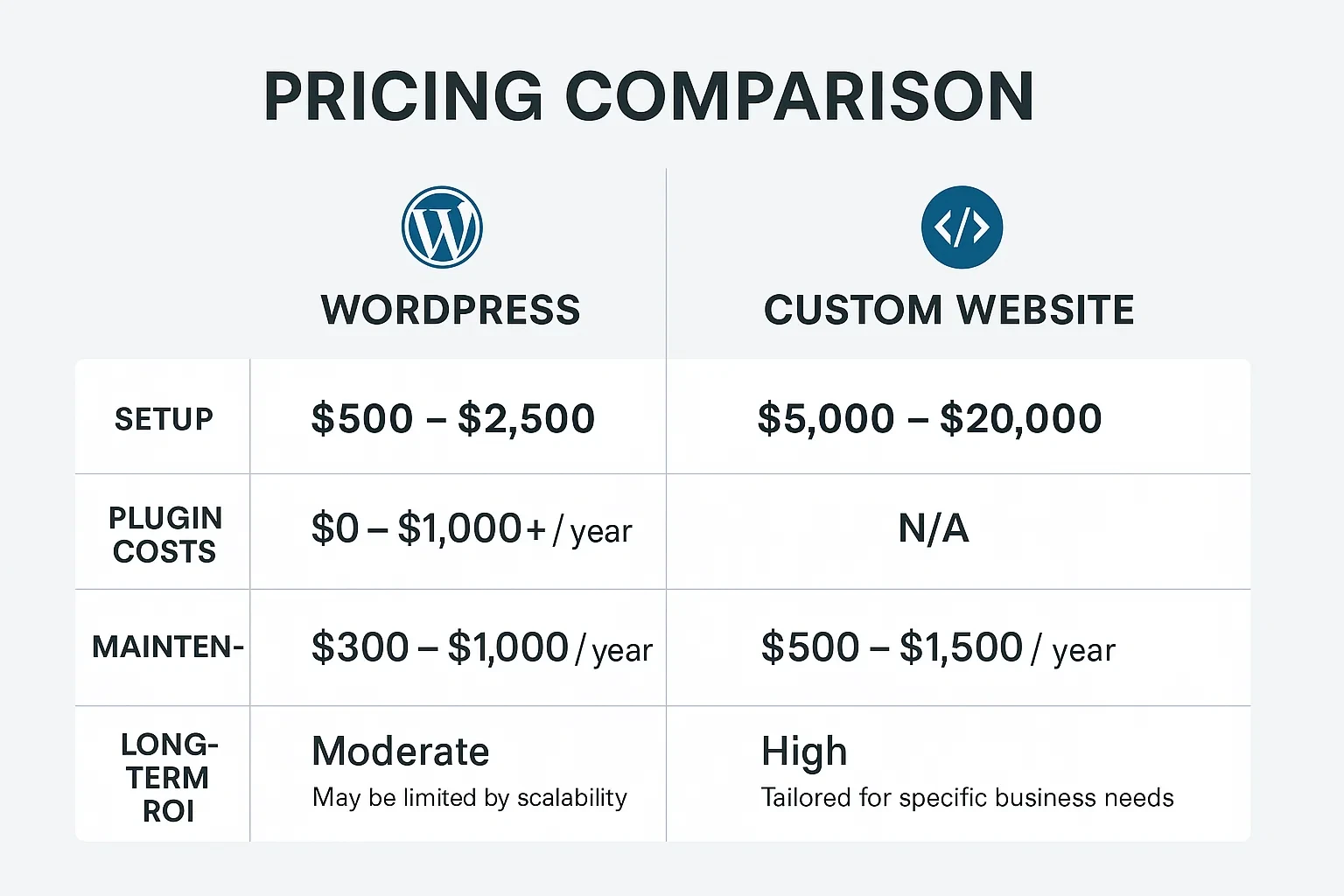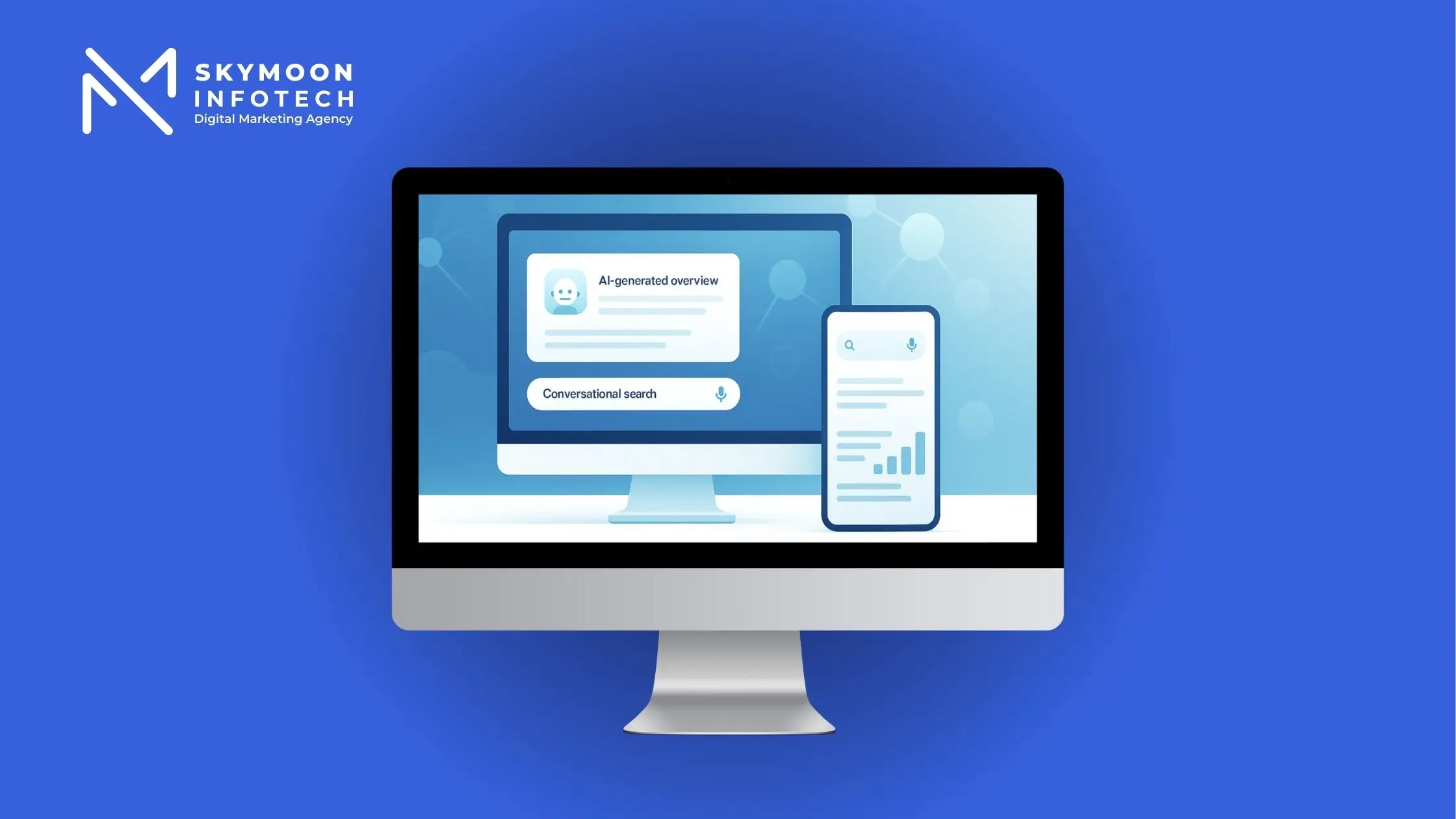Understanding WordPress vs Custom Code
When planning a new website, most businesses face a critical decision — whether to go with a pre-built content management system like WordPress or build a custom-coded site tailored to their exact needs. Let’s break down how each approach works and where they shine.
What’s the difference?
A WordPress vs custom website comparison starts with defining both options: WordPress is a CMS built on PHP and MySQL, offering pre-designed themes and thousands of plugins for quick deployment. By contrast, a custom website development project is built from scratch—or uses a framework—providing full control over design, features, and performance.
Use cases that matter
WordPress is ideal for content-heavy sites like blogs, e-commerce stores (with WooCommerce), and lead-gen platforms—it supports quick setup, easy edits, and cost-effectiveness. On the other hand, if your brand requires complex web applications, unique backend workflows, or enterprise-level scalability, a custom web application is often a better long-term fit.
Interested in a custom-built solution with full design flexibility?
Check out our Website Development Services to explore bespoke platforms tailored to your needs.

WordPress Pros & Cons for Business Websites
While WordPress is a go-to for millions of websites, it’s important to weigh its strengths and limitations before deciding if it’s the right platform for your brand. Below, we explore what makes WordPress an attractive option — and where it might fall short.
Pros – Why WordPress Still Dominates Small to Mid-Sized Business Sites
WordPress powers over 43% of all websites, according to W3Techs. Its popularity isn’t by chance—it’s a flexible, beginner-friendly platform with thousands of plugins and themes. Here’s why it’s often the first choice for businesses:
- Quick Deployment: You can launch a business website within days using pre-built templates.
- Plugins for Everything: From SEO (like Yoast SEO) to security and analytics, plugins let you expand features easily.
- Large Community Support: With millions of users and developers, issues are quickly solved.
- Cost-Effective Maintenance: You don’t need a full-time developer for basic updates or edits.
Example: A Shopify alternative ecommerce site built on WordPress with WooCommerce may cost less than ₹40,000 to launch—ideal for D2C brands or consultants.
Cons – Limitations That May Affect Long-Term Growth
Despite its flexibility, WordPress comes with a few limitations:
- Performance Bottlenecks: Plugins can bloat your site, leading to slower loading times. Google’s PageSpeed Insights often flags WordPress sites for poor performance scores.
- Security Concerns: WordPress is open-source, making it a common target for hackers. Regular updates and security plugins (like Wordfence) are required.
- Scalability Challenges: Custom workflows or complex integrations might require heavy modifications, risking code conflicts.
- Theme Lock-In: Many businesses start with a theme but later find it hard to scale or redesign without developer support.
As highlighted in Pressidium’s WordPress vs Custom Website, while WordPress lowers the entry barrier, it’s not always ideal for enterprise or high-traffic portals.
Want to explore performance-first platforms?
Explore our Custom Website Development Services to go beyond templates and plugins.

Custom Website Development – Tailored for Scalability & Performance
WordPress remains one of the most scalable, user-friendly, and widely supported CMS platforms available. Kinsta’s 2025 CMS review highlights its strengths in content flexibility, plugin ecosystem, and cost-effectiveness for growing businesses.
Why Go Custom? The Power of Full Control
When comparing WordPress vs HTML/CSS, WordPress simplifies setup and editing, but HTML-based custom websites deliver greater performance and full control over source code. This allows complete freedom over design, performance, and security. Businesses that outgrow template-based platforms often migrate to custom setups.
Benefits include:
- Faster Load Times: Clean, lightweight code means faster pages—an SEO ranking factor confirmed by Google’s Core Web Vitals.
- Custom Integrations: Whether it’s an ERP, CRM, or headless CMS, developers can tailor backend functionality without limitations.
- Stronger Security: Proprietary codebases have a lower risk of plugin-related vulnerabilities.
- High Scalability: You can design for multi-language support, advanced filtering, complex user permissions, or progressive web apps.
Brands looking for lightning-fast UX and long-term flexibility tend to lean toward custom websites.
Drawbacks of Going Custom
- Longer Time to Launch: Unlike WordPress, custom websites take time—4 to 8 weeks depending on scope.
- Higher Initial Cost: Expect to invest significantly more upfront, especially for complex functionality.
- Requires Developer Dependency: Even basic changes need technical intervention unless a CMS is integrated.
Custom websites provide full control over functionality, integrations, and backend logic, making them ideal for businesses with specific workflows or product offerings. Tadabase explains how custom-built applications can dramatically streamline internal operations and improve business agility.
Need a powerful digital foundation?
See how we tailor Web Design Services to suit unique business goals.

WordPress vs Custom Website – Cost Comparison & ROI Analysis
Custom websites can range anywhere between $3,000 to $25,000 depending on the level of personalization, integrations, and development team involved. According to Forbes Advisor, real-world website costs vary widely—from $100/month DIY builders to $100K+ bespoke builds for enterprises.
Upfront Cost vs Long-Term Value
One of the biggest deciding factors between WordPress and custom development is cost.
| Platform | Development Cost | Maintenance Cost | Launch Time |
|---|---|---|---|
| WordPress | $500–$3,000 | Low (plugin/themes) | 1–2 weeks |
| Custom Website | $2,000–$20,000+ | Medium–High | 4–8 weeks |
While WordPress may seem budget-friendly initially, costs can rise over time through premium plugins, security updates, and developer assistance. On the other hand, custom websites involve higher initial investment but offer better ROI in terms of performance, scalability, and brand uniqueness.
In many cases, whether you hire a WordPress developer or a custom developer will directly influence your total budget and project timeline.
Maintenance & Hidden Costs
- WordPress: Plugin conflicts, version updates, security patches, and bloated themes can require frequent maintenance.
- Custom Website: More stable, but ongoing costs depend on how much content you need to update or scale.
Looking to launch a high-performing site with strategic ROI?
Explore our Web Development Services for custom-built digital experiences.
WordPress vs Custom Website – Which One Is Right for Your Business?
Choosing the best platform for your business website involves balancing performance, budget, and future scalability — all of which we’ve outlined below.
Decision-Making Checklist
If you’re still unsure which path to take, here’s a decision matrix to help you weigh your options:
| Criteria | Choose WordPress If… | Choose Custom Code If… |
|---|---|---|
| Budget | You’re starting small or bootstrapped | You’re ready to invest in long-term scalability |
| Timeframe | You need a site live within 1–2 weeks | You can wait 4–8 weeks for development |
| Functionality | You require standard features or eCommerce | You need advanced tools or integrations |
| Control & Scalability | You’re okay relying on plugins & themes | You want full control over structure & performance |
| SEO & Speed | You’re using optimized themes & plugins | You need blazing-fast load times & clean code |
Industry Use Cases
- Startups, Coaches, and Bloggers: WordPress is perfect for quick MVPs, content-first brands, and budget-conscious businesses.
- SaaS, Fintech, and Enterprise Brands: Custom-coded websites win with performance, complex integrations, and unique branding needs.
Final Thoughts
Both WordPress and custom websites can deliver great results—it’s about your goals, resources, and growth plans. If you’re building a long-term digital asset with tailored features, custom development is the way to go. If you’re focused on speed, budget, and content-first strategy, WordPress offers everything you need.
Not sure whether to choose a CMS or go headless?
Learn how we approach custom web applications to deliver performance-first websites.
FAQs About WordPress vs Custom Websites
Is WordPress good for business websites?
Yes, WordPress is a great choice for small to mid-sized businesses that need flexibility, fast setup, and easy content management. It supports plugins for SEO, security, and design — making it ideal for budget-conscious businesses.
What are the pros and cons of WordPress?
Pros: Quick setup, large plugin ecosystem, user-friendly CMS.
Cons: Slower speed if bloated with plugins, frequent updates, limited scalability.
When should I choose custom website development?
If your business needs advanced features, complex integrations, or has strict performance/UX goals, custom website development offers more flexibility, speed, and branding power.
What’s the cost of custom development vs WordPress?
Custom websites cost significantly more upfront ($2,000–$20,000+), while WordPress can start under $1,000. However, long-term ROI and performance are usually higher with custom solutions.
Which is more scalable – WordPress or custom websites?
Custom websites offer better scalability, especially for large-scale operations or enterprise platforms. WordPress can scale with optimization, but performance can degrade over time.








